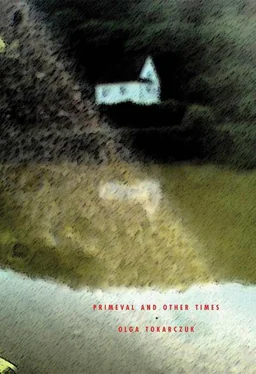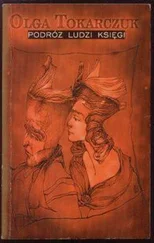Things that did not immediately reveal their inner fourfold structure presented Izydor with a challenge. One time he was watching Witek, who was trying to break in a young horse. The horse bucked and threw him to the ground. Izydor thought the configuration popularly known as “a man on a horse” only appeared to have two elements outwardly. Indeed, principally there is a man, and a horse. There is also a third whole, namely a man on a horse. So where is the fourth element?
It is the centaur, something more than a man and a horse, it is a man and a horse in one, the child of a man and a horse, a man and a goat, Izydor suddenly realised, and once again felt the same, long forgotten anxiety that Ivan Mukta had once left him with.
For ages Misia refused to cut her long grey hair. Whenever Lila and Maja came, they brought special dye with them and over an evening they restored her hair’s original colour. They had an eye for colour – they chose exactly the right one.
One day something suddenly happened to her, and she had her hair cut. As the dyed chestnut curls fell to the floor, Misia looked in the mirror and realised she was an old woman.
In spring she wrote back to the young squire’s daughter to say she wasn’t taking holiday guests, not this year, nor the next. Paweł tried to protest, but she wouldn’t listen to him. At night she would wake up as her heart suddenly began to pound and her pulse to race. Her hands and feet became swollen. She looked at her feet, and didn’t recognise them. “I used to have slender fingers and fine ankles. My calves tensed when I walked in high heels,” she thought.
In summer, when the children came home, all except Adelka, they took her to the doctor. She had high blood pressure. She had to take pills and was not allowed to drink coffee.
“What’s life without coffee?” muttered Misia, taking her grinder from the sideboard.
“Mama, you’re like a child,” said Maja, taking the grinder out of her hands.
Next day Witek bought a large tin of decaffeinated coffee at the hard-currency shop. She pretended to like it, but once she was alone, she ground some precious, rationed real coffee beans and made herself a glass of it. With a skin, just as she liked it. She sat at the kitchen window and gazed at the orchard. She could hear the rustle of the tall grass – there was no one left to mow it under the trees. From the window she could see the Black River, the priest’s meadows, and beyond them Jeszkotle, where people were always building new houses out of white breeze blocks. The world was no longer as pretty as it used to be.
One day, as she was drinking her coffee, some people came to see Paweł. She found out that Paweł had hired them to build a family tomb.
“Why didn’t you tell me about it?” she asked.
“I wanted to give you a surprise.”
On Sunday they went to look at the deep excavation. Misia didn’t like the spot – next to old Boski’s and Stasia Papuga’s grave.
“Why isn’t it next to my parents?” she asked.
Paweł shrugged.
“Why, why, why,” he mocked her. “It’s too cramped there.”
Misia remembered how she and Izydor had once divided her marital bed.
As they were on the way home, she cast a glance at the inscription at the graveyard exit.
“God sees. Time escapes. Death pursues. Eternity waits,” she read.
The year that ensued was troubled. Paweł would switch on the radio in the kitchen and the three of them, including Izydor, listened to the reports. They didn’t understand much of it. In summer the children and grandchildren came. Not all of them, as Antek hadn’t got leave. They sat in the garden until late at night, drinking currant wine and discussing politics. Misia cast involuntary glances at the garden gate and waited for Adelka.
“She won’t come,” said Lila.
In September the house emptied again. For days on end Paweł drove his motorbike around the uncultivated fields and supervised the building of the tomb. Misia called Izydor downstairs, but he refused to come down. Instead he pored over the sheets of brown paper on which he drew his never-ending tables.
“Promise that if I die first you won’t put him in the old people’s home,” she said to Paweł.
“I promise.”
On the first day of autumn Misia ground some real coffee, tipped it into a glass, and poured on boiling water. She took some gingerbread from the sideboard. A wonderful aroma filled the kitchen. She pulled a chair up to the window and drank her coffee in small sips. Then the world exploded in Misia’s head, and tiny shards of it scattered all around. Misia sank to the floor, under the table. The spilled coffee dripped onto her hand. She couldn’t move, so she waited, like an animal caught in a snare, for someone to come and free her.
She was taken to the hospital in Taszów, where the doctors said she had had a stroke. Every day Paweł came to see her with Izydor and the girls. They sat by her bed and talked to her the whole time, though none of them was sure if Misia could understand. They asked questions, and sometimes she nodded to say “yes” or shook her head to say “no.” Her face had caved in, and her gaze had turned inside and gone dull. They went into the corridor and tried to find out from the doctor what would happen to her, but the doctor looked preoccupied with something else. Red-and-white flags hung in every window of the hospital, and the staff were wearing strike armbands. So they stood at the hospital window and explained this misfortune to each other. Maybe she had hit her head and damaged all those centres, of speech, joie de vivre, interest in life, the will to live. Or maybe something else had happened: she had fallen and taken fright at the thought of her own fragility, at the miraculous fact of being alive, she had taken fright at the idea that she was mortal, and now, before their very eyes, she was dying of fear of death.
They brought her compote and oranges acquired at vast expense. Gradually they resigned themselves to the idea that Misia would die, that she was going somewhere else. But what they feared most was that in the fervour of dying, the separating of the soul from the body or the fading of the biological structure of the brain, Misia Boska would be gone forever, all her recipes would be gone, all the chicken liver and radish salads, her iced chocolate cakes, her gingerbread, and finally, her thoughts, her words, the events she had taken part in, as ordinary as her life, and yet – each of them was sure of it – lined in darkness and sorrow, because the world is not friendly to mankind, and the only thing to be done is to find a shell for yourself and your loved ones, and stay in there until you are released. As they looked at Misia sitting in bed, with her legs covered by a blanket and her face absent, they wondered what her thoughts were like – whether they were in shreds, ripped up, just like her words, or maybe hidden in the depths of her mind, preserving all their freshness and strength, or perhaps they had changed into pure images, full of colours and depth. They also reckoned on the fact that Misia may have stopped thinking. That would mean the shell was not airtight, and Misia had been struck down by chaos and destruction while still alive.
Meanwhile, until she died a month later, the whole time Misia saw nothing but the left side of the world, where her guardian angel was waiting for her, who always appeared at truly important moments.
As the tomb still wasn’t ready, Paweł buried Misia next to Genowefa and Michał. He thought she ought to like that. He himself was fully occupied with building the tomb, and kept giving the workmen more and more complicated orders, so the work dragged on. That was how Paweł Boski, inspector, kept putting off the time of his own death.
Читать дальше












